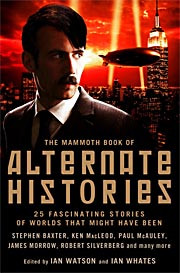Various updates
Submitted by Kimon...And this is 2011 and we're still here! Some updates in the world of KSR:

The Lucky Strike has been included in a collection with stories from various authors (such as Ken McLeod and Stephen Baxter): The Mammoth Book of Alternate Histories, by Robinson (no, not that one, the publisher) and Running Press. With the PM Press release also last year, The Lucky Strike gets a lot of attention! Nice cover! (right)
The Lunatics has been included in the short story collection Brave New Wolrds: Dystopian Stories, by Night Shade Books (paperback). Editor John Joseph Adams created a whole mini-site for the book and conducted a short interview with Robinson himself for the occasion! Excerpt:
What was the genesis of the story–what was the inspiration for it, or what prompted you to write it?
My wife and I were living in Zurich while she was doing a post-doc, and we hung out with all the other post-docs, most of them chemists. One night I saw a periodic table in someone’s kitchen and noticed the element promethium. The story came from that.
Meanwhile, The Best Of Kim Stanley Robinson has been released in paperback and Kindle editions by Night Shade Books.
Galileo's Dream has been translated in Spanish by Minotauro, and reviews are up! As far as I can tell, this is the first translation of the novel, ¡felicidades a los Españoles!
Galileo's Dream has also been nominated for the 2011 IMPAC Dublin Award. That's notable because 1) The nominees are designated only by public libraries from all over the world, which is brilliant, and 2) It's a "general"/"non-genre" award, which means Galileo's Dream is nominated for its own literary merits beyond its qualities as a specifically science fiction novel, which is also brilliant! The shortlist should be announced on April 12th and the winner on June 15th.
Back in October 2010, Kim Stanley Robinson participated in a conference at UC Santa Cruz, Emerging Terraformations: Climate Change, Geoengineering and Science Fictions. Speakers also included Chris McKay, Gregory Benford and others. Stan was interviewed by Colin Milburn (English and Science and Technology Studies, UC Davis). I only found a "liveblogging"...blog entry about this event over here on a very interesting blog! Written as cliff notes. Live reporting. Excerpt:
Economics is geoengineering. Our economics are not properly calibrated to long term survival on the planet. two ways to talk about it:
False pricing. We have never charged ourselves properly. Everything costs a lot less than it should. B/c we have shifted off costs to future generations. Charge less for something than it costs to make it = predatory dumping. Who are we predating on? generations of the future. can defend themselves. Imagine them as little babies underfeet, imagine us beating them, that's what we're doing. Imagine each generation as equal to us in economic value. We've systemically undervalued future generations. Geoengineering: properly pricing things. Post-capitalism.
A portion of this population will call that a tax. Immediately thrown back into framework of our economy. Political opposition, intense avoidance of economical environmentalism. Pro-carbon party. Will always be controversy. Biz won't like it b/c it's not profitable. Paradigm buster. We claim to have an economy that can put a price on everything. There are religious fundamentalists who won't like it:thinking about Earth as a planet in a secular, scientific world view. Global changes will never be visible to individual senses. With the exception of ice. that's not true. Increasingly hot summers and warm winters are really easy to perceive. You have to trust science to believe it. Science is often attacked as a stand-in for government, as atheist thing. Culture of anti-intellectualism and anti-science. Discrepancies and incoherences involved. Should be much more effort made to show that Sciences are conciliate, you can't cherry pick. It will always be resisted and controversial b/c it requires a trust of science.
On podcast StarShipSofa, Josh Roseman conducts a reading of the title story from Escape From Kathmandu, in serial style! Beware of yeti hunters in Part 1, Part 2 and Part 3!
Speaking of audio material, KSR.info contributor Albinoflea has tracked down the audio drama adaptation of The Lucky Strike, performed by the full cast of Seeing Ear Theatre! Recorded circa 2003 (to be confirmed) and clocking at 73min! The audio files can be found on Archive.org for your listening pleasure!



